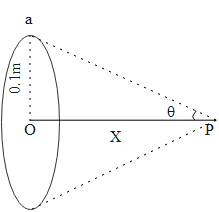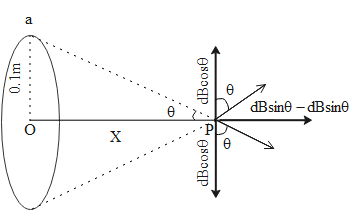Question
Question: The magnetic field at the center of a current-carrying loop of the radius \(0.1m\) is \(5\sqrt{5}\) ...
The magnetic field at the center of a current-carrying loop of the radius 0.1m is 55 times that at a point along its axis. The distance of this point from the center of the loop is
A. 0.2m
B. 0.05m
C. 0.1m
D. 0.25m
Solution
Every current-carrying conductor produces a magnetic field around its circumference. The field lines which are produced never intersect each other. The magnetic field at a point generated around a current-carrying conductor decreases with the increase in the distance of the point from the center.
As per the given data,
The radius (R) of the circle is 0.1m (10cm)
The magnetic field at the center (Bcenter) is 55(Baxis)
Complete answer:
The condition given in the question can be visualized as shown in the diagram below.

According to the Biot-Savart's Law, the magnetic field at the center of the circular loop is given as,
Bcenter=2Rμ0I
So from the given information
Bcenter=55Baxis=2Rμ0I...(1)
In the case of a circular conductor loop, every point of the conductor has its impact on the magnetic field at a point tangentially to the loop. The magnetic field can be divided into Cartesian coordinates x and y.

The sin component of the magnetic field will be canceled out. So the magnetic field on a point on the axis of the current-carrying loop is given by,
Baxis=2(R2+X2)23μ0IR2....(2)
Where,
R Is the radius of the circle
X Is the distance of the point from the center of the circle
Combining equations (1) and (2),
Bcenter=552(R2+X2)23μ0IR2⇒2Rμ0I=2(R2+X2)23μ0IR2
This equation can be simplified as,
(55)2=R6(R2+X2)3⇒125=R6(R2+X2)3⇒125=1+(R2X2)⇒R2X2=124⇒X=2R
By putting the value of radius in cm
X=2(10)∴X=20cm=0.2m
So, from the above calculation, we can conclude that the distance of the point P from the center of the loop is 0.2m.
And the correct option which satisfies the given situation in the question is Option A.
Note:
The Biot-Savart's Law was discovered by Sir Jean-Baptiste Biot and Sir Félix Savart in 1820. This law was resultant of the discovery of magnetic induction (B) which is proportional to The magnetic field (H). They mathematically formulated an equation of the magnetic induction produced due to a current-carrying conductor.
